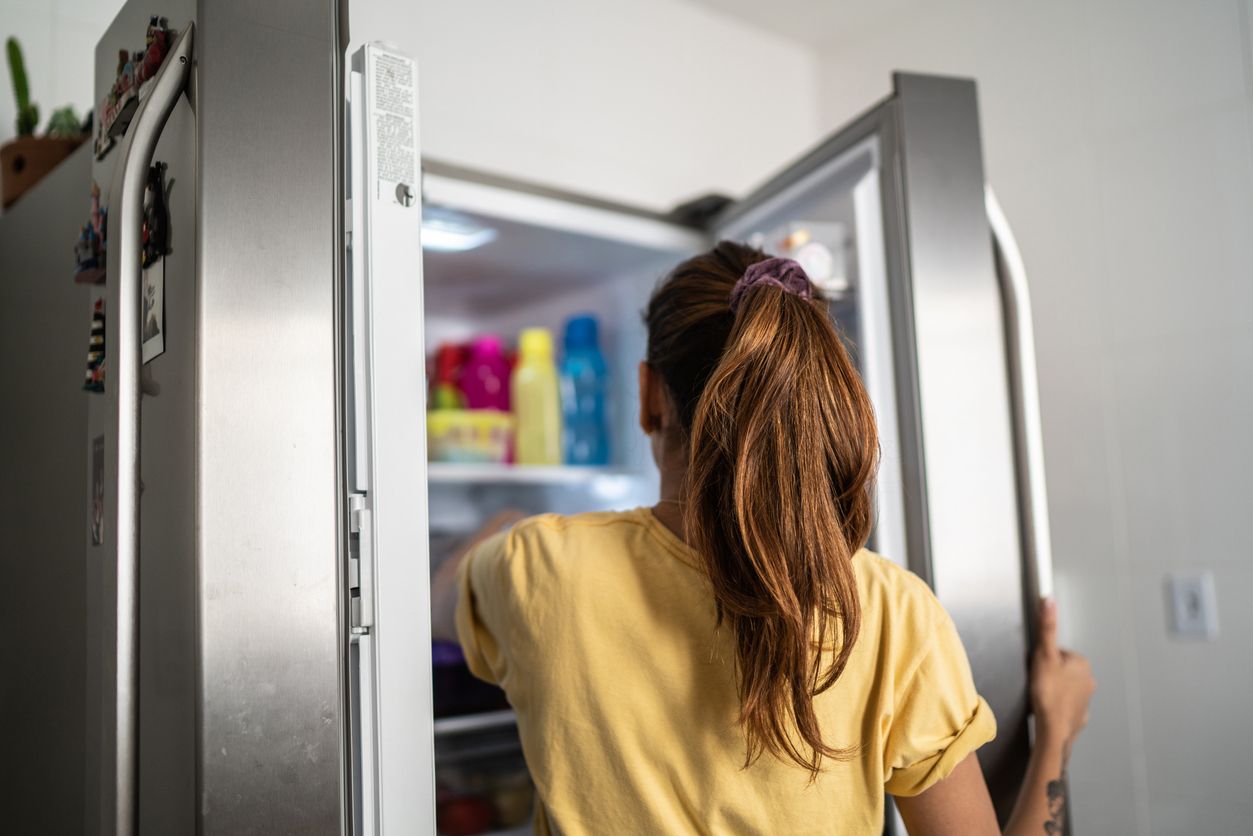

- Eating only (or mostly) later in the day is a common pattern among people with eating disorders. It can sometimes be a sign of night eating syndrome (NES), a form of OSFED, but it is also associated with other diagnoses.
- There are several reasons a person might only eat at night, including emotional distress, a physiological response to previous restriction, and/or a desire to control or limit overall food intake.
- Whether or not this eating pattern is due to an underlying eating disorder, it can negatively impact mental and physical health and quality of life.
- Night eating is addressed during eating disorder treatment by establishing normal eating habits that involve regular meals and snacks during the day.

When we think about food-related behaviors in eating disorders, we often focus on the “what” and the “how.” What are they eating? Is it too much, too little, not enough variety? And how are they eating? Have they adopted rituals around food, do they eat in secret, do they lose control when they eat? But one important factor that tends to get ignored is the “when.” For those with eating disorders, disordered behaviors often involve the timing of meals and snacks—and for many, this means only (or mostly) eating at night.
When someone eats (or doesn’t eat) can be a sign of an eating disorder, and can perpetuate certain disordered patterns. This tends to show up as restricting food during the first part of the day, and eating all or the majority of one’s calories later in the day or at nighttime. Only eating at night can pose a variety of physical and psychological risks and challenges to recovery. Read on to learn more about why many people with eating disorders develop the pattern of only eating at night, what conditions the behavior is associated with, why it can be harmful, and how to stop.
What is night eating (or only eating at night)?
Night eating or only eating at night is exactly what it sounds like. The specifics will look different from person to person, but the general pattern remains the same: routinely skipping breakfast and eating nothing or very little throughout the rest of the day, then, as evening approaches, allowing food. For some people, this might mean engaging in a binge; for others, it may mean eating a relatively small amount of food that still accounts for most of their daily intake.
What is night eating syndrome (NES)?
While people with several different types of eating disorders may engage in night eating, it’s worth noting that there is a specific eating disorder characterized by this pattern, known as night eating syndrome (NES).
According to the Cleveland Clinic, those with NES typically wake up several times during the night to eat, and find it difficult to fall back asleep without feeling full. According to the DSM-5, NES involves recurrent episodes of night eating either after dinner or after waking up from sleep.
Some vital stats on NES criteria and prevalence:
- NES is a type of other specified feeding or eating disorder (OSFED).
- NES is defined by excessive food intake in the evening or nighttime (i.e. consuming at least 25% of a person’s daily calories after dinner, or waking up throughout the night to eat).
- About 1.5% of people in the United States have NES, but many people with other eating disorders tend to eat only or mostly later in the day without meeting the criteria for NES.
NES is different from sleep-related eating disorder (SRED), which can cause individuals to eat uncontrollably while mostly or completely asleep and have little to no memory of the episodes the next morning. Those with NES, on the other hand, are aware of their night eating and can recall it the next day, but the behavior can’t be explained by factors like:
- Sleep-wake cycle changes
- Social norms
- Substance or medication use
- Other mental or physical disorders
“For individuals with NES, the nighttime eating pattern is driven by a circadian rhythm disruption,” says registered dietitian and certified personal trainer Alix Turoff, RD. “People may have a suppressed appetite in the morning, combined with increased hunger or a compulsion to eat in the evening or overnight. While NES can co-exist with eating disorders, its drivers are more rooted in sleep-wake rhythm dysregulation than in weight-control behaviors. Still, NES can overlap with eating disorder symptoms, and the two can reinforce each other.”
While the DSM doesn’t include criteria for how often night eating must occur or how long these behaviors should persist in order to receive an NES diagnosis, those with NES typically have at least two episodes per week. A diagnosis also includes meeting at least three of the following criteria:
- A lack of desire to eat in the morning and/or skipping breakfast four or more times per week
- The presence of a strong urge to eat between dinner and sleep onset and/or during the night
- Trouble falling or staying asleep four or more times per week
- Holding the belief that one must eat in order to initiate or return to sleep
- Having a frequently depressed or worsened mood in the evening
Because a pattern of waking up to eat can significantly impair daytime functioning and negatively affect mental health, treatment for NES is essential and may include a variety of different therapies, including those used to treat general night eating.
What causes some people to only eat at night?
There are a number of different reasons why someone with an eating disorder might develop this eating pattern. “Eating predominately at night is a common symptom in eating disorders because it can reflect a combination of physiological, psychological, and behavioral factors tied to the disorder’s underlying dynamics,” says Adriana Lindenfeld, LMHC, a therapist at Equip.
Daytime restriction
“From a physiological standpoint, irregular eating patterns or prolonged restriction during the day can disrupt hunger and fullness cues, leading to increased cravings and overconsumption later in the day.” (This underscores the notion that most, if not all, eating disorders are rooted in restriction).
Turoff explains this phenomenon further, adding that people with restrictive eating disorders such as anorexia often develop night eating as a response to calorie restriction during the day. “When someone spends the entire day suppressing hunger or adhering to rigid food rules, the body and brain eventually override those restrictions,” she says. “As the day goes on, the hunger gets stronger and nighttime often becomes the point where the biological drive and physiological need to take in calories breaks through. Patients will often say they feel ‘fine’ or ‘not hungry’ all day, which can also be a result of eating at night and the guilt that comes with it the next morning leading to more restriction—and, eventually, they become overwhelmingly hungry in the evening because their energy needs haven’t been met.” In other words, eating at night can be one version of the binge-restrict cycle.
Marriage and family therapist Alyssa Mass, LMFT, agrees that night eating is often a consequence of not providing the body with enough calories during the day. “My first question to people with eating disorders who are eating at night is, ‘what have you been eating during the day?’” she says.
Registered dietitian nutritionist and certified intuitive eating counselor Katy Zanville, RDN, says that restriction during the day can show up in a few different ways, like skipping meals, undereating carbohydrates, or eating small portions that aren’t sufficient for your nutritional needs. “Another form of restriction during the day can be psychological—like eating foods that you label as ‘good’ during the day and allowing foods labeled as ‘bad’ at night,” she says. “This sets you up to eat past fullness on foods that are restricted during the day.”
Calorie “banking”
Those with anorexia or other restrictive eating disorders might “save” calories for later in the day as a way to exert some control, both over their food intake and their emotional state. “Eating later in the day might reflect an attempt to delay or minimize caloric intake as long as possible, potentially as a way to ‘earn’ the right to eat,” says Lindenfeld. “This pattern might also reflect rigid, ritualized eating behaviors or avoidance of eating in social settings.”
Managing difficult emotions
Night eating can also be a response to distressing emotions, like stress, anxiety, and loneliness, Lindenfeld explains. “The evening hours—often quieter and less structured—can create a vulnerable window for compulsive eating, especially if restriction or emotional suppression occurred earlier in the day,” she says, adding that eating at night can be a way of managing anxiety or avoiding feelings of guilt that they know they would feel after eating earlier in the day.
Mass adds that nighttime might carry particular emotional resonance that leads to eating. “If daytime restricting isn’t in play, then it’s a discussion around what nighttime means,” she says. “For some it may be a time where stressful thoughts have the space to come in and food may quiet or mute that noise. For others it may feel like a more relaxed time when the world around them is quiet, and eating at night may feel relaxing or like a treat for a hard day.”
Fear of judgment
For those with binge-type disorders such as binge eating disorder (BED), nighttime eating can be less related to biological starvation and more emotional or related to environmental factors, according to Turoff. “People may eat exclusively or primarily at night because it feels private, they’re less likely to be observed or judged, or they associate nighttime with relief from stress,” she says. “I frequently see patients who feel ashamed eating during the day but describe nighttime as the only time they ‘allow themselves’ to eat freely. These patients might also find that they’re able to go hours without food during the day because they’re still full from the night before so they may actually not feel hungry during the day but it’s because of the pattern of overeating at night which ultimately fuels the cycle.”
Hormonal factors
From a physiological perspective, hormonal imbalances that throw off a person’s hunger and fullness cues can also play a role in some cases.
Which eating disorders involve only eating at night?
Lindenfeld says that eating only (or mostly) later in the day can be a symptom of a number of different eating disorders, including:
“Although binge behaviors aren’t exclusive to nighttime, BED often involves episodes of consuming large quantities of food during the evening hours, especially if the person has restricted their intake earlier in the day,” Lindenfeld says. Research also demonstrates this pattern: in a study of people with BED, researchers found that breakfast was the least commonly consumed meal, with dinner being the most common meal and evening the most common time for snacking.
Night eating can also be a symptom of bulimia: “While binge episodes in bulimia can occur at any time, they often happen at night due to emotional triggers, physical hunger following restriction, or feelings of isolation,” Lindenfeld says.
As mentioned above, people with anorexia might eat primarily at night to minimize overall caloric intake, and OSFED, which encompasses a wide range of disordered eating patterns, can also include eating at night.
Could eating only at night be a sign of something besides an eating disorder?
“While night eating in restrictive eating disorders is often a physiological rebound from inadequate calorie intake during the day, it can also show up outside of clinical eating disorders. This can be related to factors like diet culture, diet history, or lifestyle,” Turoff says. “For example, chronic dieters may unintentionally undereat earlier in the day and then find themselves hungrier at night and in other cases, people who work irregular hours—like a nurse who works nights three days per week—might have a dysregulated appetite rhythm independent of an eating disorder.”
Some other factors that might lead someone without an eating disorder to eat only (or mostly) at night include disrupted sleep patterns, emotional distress (which can trigger emotional eating), and diet culture. Unfortunately, it’s extremely common for people without eating disorders to adopt pretty disordered eating habits in an attempt to lose weight, look a certain way, or meet certain “healthy” standards around diet or fitness. One prime example is intermittent fasting, which might be appropriate for some people for a certain amount of time, but often does more harm than good (and may eventually lead to an eating disorder).
“Eating only at night does not automatically mean a person has an eating disorder, but the context of the behavior is what matters,” Turoff says, noting that nighttime eating can indicate an eating disorder if:
- There’s intentional restriction during the day to “bank” or “save up” calories for later, or to avoid eating in front of others.
- The night eating feels compulsive, out of control, or driven by intense hunger that results from not eating enough during the day.
- Nighttime eating is associated with shame, secrecy, or emotional distress around or after eating.
- Night eating is paired with compensatory behaviors like restricting food the next day, overexercising, or purging to compensate.
- Night eating is a result of a rigid belief system or “rules” created around when someone is “allowed to eat.
“Whether or not the behavior is a result of an eating disorder or something else comes down to whether that person feels their night eating causes distress, lack of control, and whether the behavior is rooted in restriction or emotional avoidance versus physiology or schedule,” Turoff says.
What if I’m only hungry at night?
Certain people struggle to feel hunger at any time of day other than night. For some, breakfast can be a challenge, and for others, a busy schedule might mask hunger cues throughout the day. While many of us have been told to “only eat when you’re hungry,” that rule isn’t helpful for people with suppressed or unreliable hunger cues, and it can perpetuate the cycle of disordered eating.
“People’s bodies can and do have different rhythms and that’s okay,” Mass says. “For people who have a harder time eating during the day, we may talk about ‘breaking the fast’ instead of breakfast. What’s the first meal of the day and how many hours are between the last meal of one day and the first meal of another? From there, we might discuss the reality of their daily schedule and how we get a certain amount of calories in by a certain time.”
While different people have different cues for hunger and fullness (some may feel a stomach rumble when they are hungry and others may get a headache or feel weak, for example), eating disorders can make it difficult to feel those cues at all. Food restriction is at the core of most eating disorders—not just anorexia—so it’s important to understand that skipping meals and snacks throughout the day, even if you don’t feel hungry, can worsen eating disorder symptoms. Those with bulimia or binge eating disorder, for example, tend to binge after periods of restriction, and the biological hunger that results from that restriction is what triggers the binge and contributes to feeling out of control.
Getting adequate nutrition throughout each day is essential for overall health and for treating a variety of eating disorders. That’s why at Equip, patients and loved ones work closely with a registered dietitian to prioritize regularly timed meals and snacks, diversifying the types of food a patient eats, and challenging and breaking established food rules.

The risks of only eating at night
Eating only (or mostly) at nighttime can have negative effects on a person’s physical and mental health, as well as their relationships and quality of life, regardless of whether or not they have an eating disorder.
“Physically, nighttime eating disrupts the body’s natural circadian rhythm, which governs digestion and metabolism,” Lindenfeld explains. “Consuming large amounts of food late at night can lead to gastrointestinal issues, and increased risk of conditions like insulin resistance, type 2 diabetes, and cardiovascular disease.” She adds that it can also affect sleep quality, because your body’s efforts to digest all that food can make it tough to fall or stay asleep.
Here’s a snapshot of the potential negative consequences of only eating at night:
- Increased risk of diabetes. Research has shown that regularly eating very large meals late in the day is linked to elevated levels of glucose and insulin, which decreases insulin sensitivity and increases the risk for type 2 diabetes.
- Cardiovascular risk. Habitual night eating has been associated with the progression of arterial stiffness, which is a significant predictor of heart disease.
- Acid reflux or gastroesophageal reflux disease (GERD). Eating within two to three hours of bedtime can trigger increased acid production in the stomach, and lying down soon after eating can encourage this acid to flow into the esophagus, causing acid reflux and heartburn.
- Hormonal imbalance and intense cravings: Restricting food during the day can disrupt the balance of hormones involved in the hunger-fullness cycle.
In terms of psychological impact, Lindenfeld notes that nighttime eating is often associated with feelings of shame, guilt, and loss of control, which can amplify anxiety, depression, and low self-esteem. Only eating later in the day can also impact social functioning, as people might avoid situations during the day that involve eating. This can hurt relationships, which can worsen the other negative psychological effects of nighttime eating.
According to Turoff, night eating can cause:
- Increased shame
- Guilt
- Preoccupation with food, “especially when the nighttime eating feels ‘sneaky,’ secretive or out of control”
- Reinforcement of a binge-restrict cycle
- Social isolation
“Over time, these patterns can disrupt metabolism, perpetuate guilt and shame cycles, and exacerbate the psychological and physical toll of an eating disorder,” says Lindenfeld.
How night eating impacts sleep
One of the most significant ways that night eating negatively affects overall health is by disrupting sleep. “People don’t sleep well when they eat at night,” Mass says. “During sleep, our body should be at rest, but food can take up to six hours to digest. That means you really have to subtract six hours from your sleep time. So, eight hours of sleep will feel like two because even though you were asleep, your body was working.”
Here are some of the ways that disordered eating patterns (including only eating at night) can negatively impact sleep:
- While a lack of nutrition can result in fatigue during the day, it can actually lead to insomnia at night, and hunger can also cause obsessive thoughts about food, making it more difficult to sleep.
- Because those with eating disorders may be undernourished or underweight, they may have trouble regulating their body temperature, which makes it difficult to feel physically comfortable and fall asleep.
- If a person binges (and/or purges) at night, physical side effects (like acid reflux, bloating, and digestive discomfort) and emotional effects (like shame and guilt) can make it hard for them to fall asleep.
- The possible malnutrition that may result from only eating at night can cause sleep cycle disruptions, including reduced rapid eye movement (REM) sleep This can have a significant effect on mental health and cognitive function. Restricted or poor quality sleep, in turn, can cause a significant increase in ghrelin (the "hunger" hormone), which may perpetuate the cycle of disordered eating.
How is night eating addressed in eating disorder treatment?
According to Turoff, the first step in getting help for night eating is evaluating whether nighttime eating is a response to inadequate calorie intake or something else. “More often than not, people who ‘aren’t hungry’ earlier in the day have unintentionally conditioned their bodies to expect food only at night,” she says. “Over time, hunger cues become blunted and untrustworthy. At first, this usually requires a more structured approach, especially for individuals with eating disorders who aren’t able to ‘intuitively eat,’”
With the help of a team, individuals who struggle with night eating can begin to learn “mechanical eating” during the day. Mechanical eating is when someone eats on a schedule, such as every three to four hours, independent of hunger cues,” Zanville says. “Modifying the texture of foods, eating safe or comfort foods, or relying on smoothies and nutrition shakes can also help with poor appetite during the day.”
According to Lindenfeld, addressing this pattern of eating involves a multidisciplinary approach that targets the behavioral, psychological, and physiological factors contributing to the behavior. “A key focus is restoring regular eating patterns throughout the day to regulate hunger and satiety cues,” she says. “This often involves structured meal planning with the guidance of a registered dietitian, and encouraging balanced meals and snacks spaced evenly to prevent daytime restriction.”
Treatment might also include cognitive behavioral therapy (CBT) to address distorted thoughts and feelings that tend to lead to nighttime eating, as well as helping people develop healthier coping strategies for dealing with triggers and distressing emotions.
What to do if you or a loved one are struggling with eating only at night
If you find that you’re eating all (or the majority of) your food in the evening and are restricting throughout the day, or have noticed someone in your life doing this, it could signal an eating disorder. And even if an eating disorder isn’t the underlying cause, eating only at night can be harmful to your mental and physical health, as well as your relationships and quality of life.
Either way, it’s important to reach out for support. Talk with your doctor or an eating disorder-informed dietitian about your concerns, and they can guide you toward resources and strategies to help shift this behavior. You can also schedule a consultation with the Equip team to talk through your concerns and what treatment options are available.
- Salman EJ, Kabir R. Night Eating Syndrome. [Updated 2022 Sep 14]. In: StatPearls [Internet]. Treasure Island (FL): StatPearls Publishing; 2024 Jan-. Available from: https://www.ncbi.nlm.nih.gov/books/NBK585047/
- Harvey, Kate et al. “Eating patterns in patients with spectrum binge-eating disorder.” The International journal of eating disorders vol. 44,5 (2011): 447-51. doi:10.1002/eat.20839
- Lopez-Minguez, Jesus et al. “Late dinner impairs glucose tolerance in MTNR1B risk allele carriers: A randomized, cross-over study.” Clinical nutrition (Edinburgh, Scotland) vol. 37,4 (2018): 1133-1140. doi:10.1016/j.clnu.2017.04.003
- Sakthivel, Sai Janani et al. “A Scoping Review on the Association between Night Eating Syndrome and Physical Health, Health-Related Quality of Life, Sleep and Weight Status in Adults.” Nutrients vol. 15,12 2791. 18 Jun. 2023, doi:10.3390/nu15122791
- Fujiwara, Yasuhiro et al. “Association between dinner-to-bed time and gastro-esophageal reflux disease.” The American journal of gastroenterology vol. 100,12 (2005): 2633-6. doi:10.1111/j.1572-0241.2005.00354.x
- Broussard, Josiane L et al. “Elevated ghrelin predicts food intake during experimental sleep restriction.” Obesity (Silver Spring, Md.) vol. 24,1 (2016): 132-8. doi:10.1002/oby.21321







